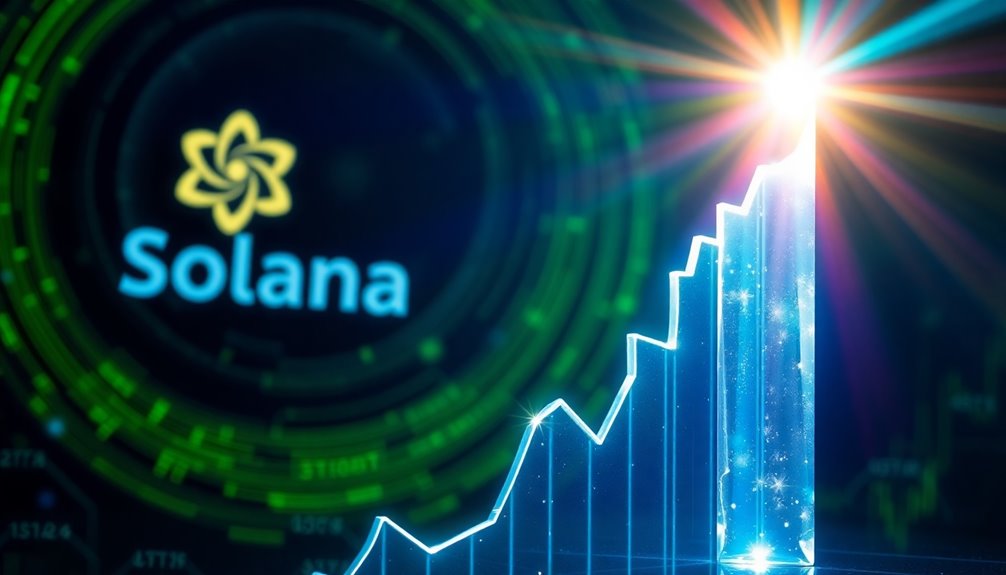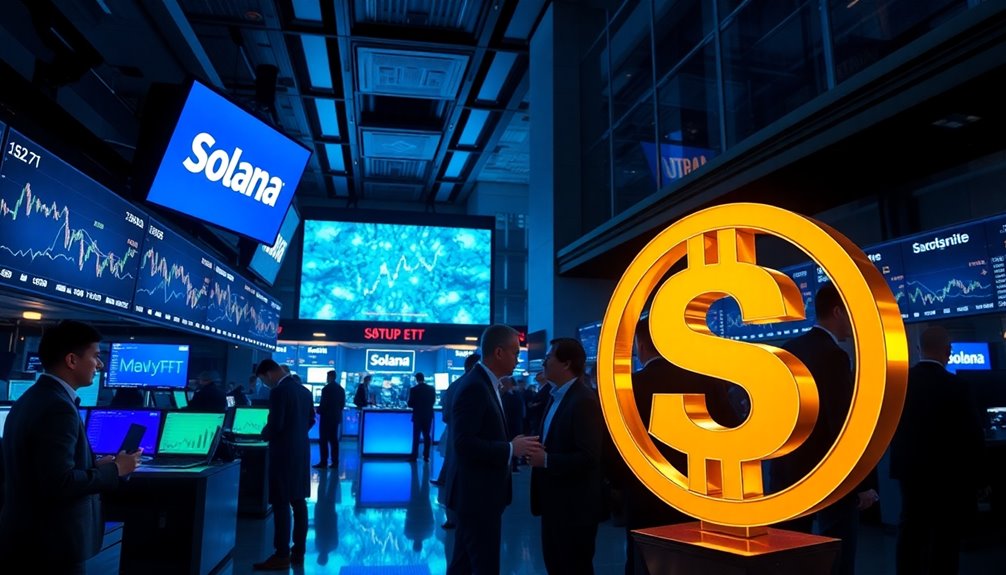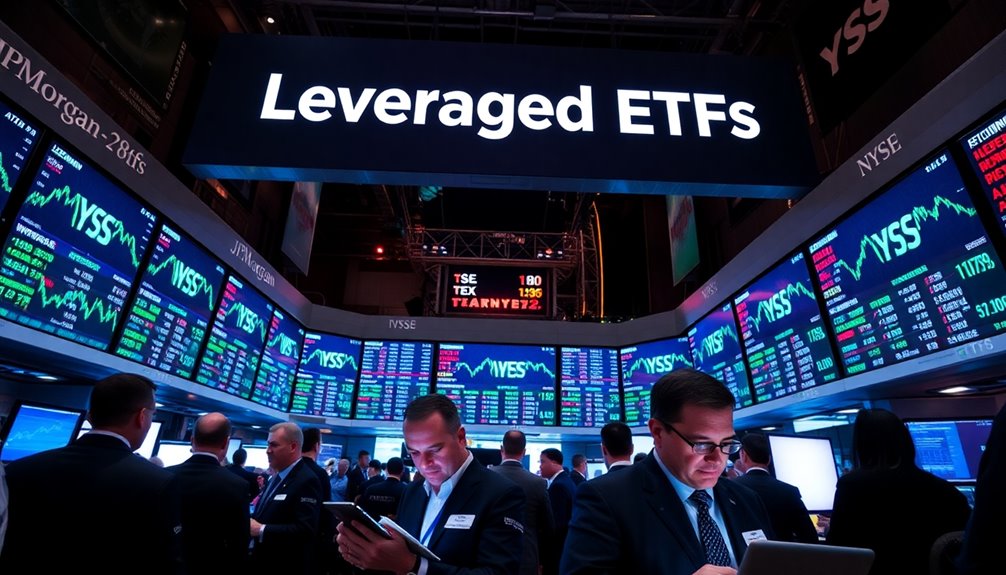Grayscale's filing for a spot Solana ETF could reshape your investment landscape. With plans to convert the Solana Trust into an ETF, it's set to track Solana's price directly. This move showcases institutional confidence, bolstered by Grayscale's substantial $134 million investment in Solana. Despite regulatory hurdles, the rising interest in crypto ETFs reflects a shift towards regulated investments. As competitors scramble to launch their own Solana ETFs, Grayscale's expertise strengthens its position. This pivotal shift might open up numerous opportunities in the crypto market for savvy investors like you, and there's much more to explore about its implications.
Key Takeaways
- Grayscale's filing for a spot Solana ETF marks a significant step in legitimizing crypto investments and enhancing institutional access to Solana assets.
- The ETF aims to directly track Solana's price, excluding staking rewards to align with SEC regulations, showcasing Grayscale's commitment to compliance.
- With over $134 million in assets, Grayscale holds the largest Solana Trust, reflecting strong institutional interest and confidence in Solana's growth potential.
- The approval of spot Solana ETFs could reshape the investment landscape, attracting traditional investors seeking regulated crypto options amid rising market demand.
- Regulatory challenges persist, with Solana classified as an unregistered security, but successful ETF launches could bolster overall market confidence and stability.
Grayscale's ETF Filing Overview

Grayscale has taken a significant step by filing a 19b-4 application with the U.S. Securities and Exchange Commission (SEC) to list a spot Solana ETF. This filing aims to convert Grayscale's existing Solana Trust into a spot ETF, bringing new investment opportunities for you. With the SEC expected to review applications by January 2025, a decision is anticipated by mid-March 2025.
The filing includes an S-1 registration form to facilitate listing on the New York Stock Exchange under the ticker symbol GSOL. This proposed ETF would directly track Solana's price, similar to Grayscale's Bitcoin and Ethereum trusts. BNY Mellon Asset Servicing will handle administration, while Coinbase Custody will act as the custodian for the ETF. Remarkably, the ETF won't include staking rewards to comply with SEC guidelines. Grayscale's Solana Trust is currently the largest Solana investment fund globally, managing approximately $134.2 million in assets. The move reflects a growing trend among crypto firms seeking SEC approval for Solana ETFs, as the exclusion of staking rewards aims to address regulatory concerns. By converting the trust into an ETF, Grayscale aims to provide you with a regulated and secure way to invest in Solana's price action. This filing also signifies growing institutional interest in Solana, as evidenced by similar submissions from firms like VanEck and 21Shares. Furthermore, the increased interest in crypto ETFs highlights a broader market demand for regulated investment options in the digital asset space.
Solana Price Surge Reaction

The announcement of Grayscale's ETF filing has sparked a significant reaction in the market, with Solana's price surging 6% shortly after the news broke. This rise took SOL to $237.14, marking a recovery from a 12% decline the previous week. The current price stability reflects growing optimism among investors, especially after Solana's recent all-time high of over $260. Additionally, the potential approval of the ETF could lead to increased demand for Solana, making it more accessible to a wider range of investors and users without direct purchases. This increased accessibility aligns with Grayscale's strategy to transition to a spot ETF.
Technical indicators back this positive sentiment. The 10-day moving average at $236.09 indicates reliable short-term support, while the 50-day moving average at $202.43 highlights an overall upward trend. With the Relative Strength Index (RSI) sitting at 56.52, it suggests there's still room for growth without hitting overbought conditions. The MACD level of 9.0691 reinforces the ongoing bullish momentum.
Market sentiment is also buoyed by a larger wave of enthusiasm across the crypto sector, which has seen Solana's market cap exceed $112 billion. As trading volumes increase, many anticipate the price could soon approach significant resistance levels, with targets set at $283 and $328 in the near term. This surge indicates that Solana remains a strong player in the evolving cryptocurrency landscape, especially considering the long-term projections for SOL, which suggest it could reach between $200 and $3,211 before 2030.
Institutional Confidence in Solana

A surge in institutional confidence is reshaping the landscape for Solana, as major asset management firms increasingly recognize its potential. Grayscale Investments is leading the charge, filing to convert its Solana Trust into a spot ETF on NYSE Arca, expanding its $134 million investment vehicle. This trust holds about 0.1% of the total SOL in circulation, making it a significant player in the ecosystem. Other firms like VanEck, 21Shares, and Bitwise are also eyeing Solana-based ETFs, indicating a broadening interest. The trust's current valuation reflects a 277% increase in crypto value over the past year, showcasing the growing momentum behind Solana. In addition, Grayscale's filing marks the fifth attempt by asset managers to introduce a SOL ETF, highlighting the competitive landscape.
The appetite for Solana is further evidenced by Hamilton Lane launching the first institutional-grade private credit fund on its blockchain. With Step Finance catering to institutional demands through its Solana Portfolio Data API, real-time insights into wallet positions and transactions are becoming a norm. Extensive token coverage offered by Step Finance allows institutions to navigate the Solana ecosystem more effectively. Brazil's approval of the world's first Solana ETF further highlights global institutional interest. As of 17 September 2024, Solana's daily active users reached 3.25 million, surpassing Ethereum's 410,000.
As Solana's user base grows—over 120 million monthly active addresses—its competitive edge against Ethereum solidifies. Low transaction fees and a thriving ecosystem of applications are driving adoption, making Solana a focal point for traditional investors seeking new opportunities.
Regulatory Landscape and Challenges

When you look at the SEC approval process, it's clear that regulatory hurdles are significant for Solana ETFs. Political influences can sway these regulations, impacting how asset managers compete for approval. As the landscape shifts, staying informed on these challenges can help you navigate the evolving market. The SEC's classification of Solana as an unregistered security further complicates the approval process for related financial products. Additionally, the Grayscale Solana Trust's investment objective remains unmet, demonstrating the complexities involved in achieving regulatory approval. Recent SEC rejections of spot Solana ETFs have further dampened investor sentiment and highlighted the ongoing uncertainty surrounding crypto regulatory frameworks. This cautious approach reflects broader regulatory concerns in the crypto sector.
SEC Approval Process
Steering through the SEC approval process for Solana ETFs presents a complex landscape filled with regulatory challenges. You'll need to understand that submitting a 19b-4 form is just the beginning. This form is essential for proposing new rules or altering existing ones, and it sets the stage for the SEC's review. Alongside this, you'll also have to prepare S-1 registration statements, which demand detailed disclosures about financial conditions, risks, and business operations. The approval of the Grayscale Solana Trust ETF represents a significant step in expanding innovative financial instruments linked to cryptocurrencies.
Expect multiple rounds of communication with the SEC, where their feedback may prompt necessary changes to your filings. The approval timeline can stretch from several weeks to months, with indications that approvals for Solana ETFs might align with potential Ether ETF approvals in Summer 2024. Moreover, the approval of spot Ether ETFs could signal a shift towards greater acceptance of cryptocurrencies, impacting the overall sentiment towards Solana. Additionally, the involvement of authorized participants is crucial in ensuring that the ETF shares can be created and redeemed efficiently throughout the trading day.
Keep in mind the SEC's scrutiny—especially regarding cryptocurrencies beyond Bitcoin. Each proposal will face close examination, possibly demanding adjustments or risking denial. Additionally, ensuring compliance with the Exchange Act criteria and maintaining ongoing transparency will be vital. The complexities of the approval process can affect the broader market, influencing both investor access and institutional interest in Solana.
Political Influences on Regulations
Steering through the complexities of Solana ETFs goes beyond regulatory filings; political influences play a significant role in shaping the regulatory landscape. The ever-changing dynamics of US elections, particularly presidential and congressional ones, can dramatically impact how cryptocurrencies are regulated. For instance, the Biden administration's focus on consumer protection contrasts sharply with the Trump administration's more conservative approach, emphasizing existing securities laws.
Political party stances further complicate matters. Republicans generally advocate for deregulation, which can boost the crypto market, while Democrats lean towards increased regulation for consumer protection and transparency. The outcome of elections can either spark optimism or trigger sell-offs, depending on the regulatory environment that follows. Additionally, the rise of Super PACs has enabled significant campaign contributions that influence which candidates prioritize favorable crypto regulations. Furthermore, the recent approval of spot ETFs has been a significant regulatory shift that may further influence the political landscape surrounding crypto.
Moreover, crypto PACs are making waves in political funding, contributing substantial amounts to support pro-crypto candidates. This influence raises questions about transparency and fairness in the political process. As a crypto enthusiast, understanding these political influences is essential, as they directly affect the regulatory landscape you're traversing. Ultimately, the balance between innovation and regulation will shape the future of digital assets like Solana. Additionally, the need for clear regulatory frameworks is becoming increasingly evident as bipartisan efforts emerge to address the complexities of the crypto market. Notably, the recent approval of spot Bitcoin ETFs has also encouraged more discussions about the regulatory landscape for other cryptocurrencies.
Competition Among Asset Managers
The competition among asset managers to launch the first spot Solana ETF is heating up, reflecting a broader struggle within the regulatory landscape. As the race intensifies, the challenges of compliance and oversight grow more intimidating. With global regulatory bodies like the SEC, FCA, and ESMA tightening their grip, asset managers must navigate a complex maze of rules designed to protect investors. This increasing scrutiny isn't just an inconvenience; it can derail your progress. Additionally, maintaining compliance with regulatory frameworks is essential to avoid costly penalties. Notably, Grayscale's recent filing for a Solana ETF could signal a shift towards greater institutional interest in the cryptocurrency space. Furthermore, the focus on enhanced disclosure obligations means that asset managers must be more diligent in their reporting to meet rising expectations. In 2023, the SEC adopted 24 rules that further complicate the regulatory environment for asset managers. During this period, the importance of cybersecurity vulnerabilities has gained attention, particularly as asset managers increasingly rely on digital platforms for operations.
Consider these three emotional stakes:
- Fear of Missing Out: The first mover advantage in launching a Solana ETF could mean millions in assets under management, leaving you behind.
- Financial Pressure: With 39% of managers citing cost concerns, the financial burden of compliance can stifle innovation and growth.
- Regulatory Anxiety: As audits become more frequent, the risk of penalties looms large, creating a constant sense of unease. Additionally, the increasing complexity of regulations means firms must invest significantly in compliance technologies to stay competitive.
In this fast-evolving market, staying ahead requires not just agility but also a firm grasp of the regulations shaping the future of asset management. The balance between innovation and compliance has never been more critical.
Competitive Market Dynamics

As Grayscale positions itself to lead the charge in the Solana ETF market, you're seeing emerging contenders like VanEck and 21Shares stepping up their game. This competitive landscape highlights a growing trend in institutional investment, as firms recognize the potential of crypto-based products. With regulatory support on the horizon, the dynamics in this space are shifting rapidly, and it's essential to stay informed. The recent launch of spot Bitcoin ETFs in January 2024 has further underscored the increasing institutional interest in crypto assets. Additionally, the rising Total Value Locked (TVL) in Solana's DeFi protocols reflects growing liquidity and confidence in the ecosystem. Furthermore, the success of Bitcoin ETFs has paved the way for more innovative offerings in the cryptocurrency space. The growing institutional interest in Solana has also fueled demand for these products, signaling a robust future for the Solana ETF.
Grayscale's Competitive Edge
In a competitive landscape filled with emerging asset managers, Grayscale stands out with its established market presence and expertise in ETF conversions. You can feel the excitement as the company holds the largest investment fund for Solana, boasting over $134 million in assets. Grayscale's experience in converting trusts into ETFs sets it apart from competitors like VanEck and 21Shares, giving you confidence in its capabilities.
Here are three key reasons why Grayscale has a competitive edge:
- Proven Conversion Success: Grayscale's track record with Bitcoin and Ethereum ETFs shows it knows how to navigate complex regulatory waters. Additionally, understanding the importance of diversifying investments can help mitigate risks associated with market fluctuations.
- Strong Custodian Support: With Coinbase Custody and BNY Mellon Asset Servicing backing the Solana Trust, you know your investments are in safe hands. Additionally, the anticipated regulatory decision on ether ETFs expected by late May could bolster Grayscale's position even further.
- Resilience Amid Challenges: Despite experiencing significant outflows, Grayscale has maintained a robust asset base, demonstrating its ability to weather market volatility. Additionally, the introduction of new assets like Sui and Bittensor reflects Grayscale's commitment to adapting its offerings to market demands. In light of Bitcoin's dominance in the cryptocurrency market, Grayscale's strategic moves could further enhance its position as a leading asset manager.
As Grayscale pushes for SEC approval of its SOL ETF, it's not just about gaining ground—it's about reshaping the landscape for institutional investment in cryptocurrencies.
Emerging Market Contenders
Grayscale's push for a Solana ETF isn't just a standalone effort; it highlights the broader competitive dynamics in the cryptocurrency market. As emerging blockchain platforms like Sui (SUI) gain traction, they're reshaping the landscape. Sui's innovative object-based data handling and the Move programming language greatly enhance scalability and speed. This means it can process transactions faster than many existing blockchains, attracting developers looking for robust solutions. Additionally, the growing interest in emerging cryptocurrencies is encouraging investors to explore diverse options beyond the established leaders. In fact, the emergence of altcoins as diverse options is reshaping investor strategies and market dynamics. Moreover, the increasing user adoption enhances the value of these cryptocurrencies as they benefit from network effects. Furthermore, the rapid evolution of AI technologies is influencing how these platforms leverage data and automation to optimize their operations. In addition, Ondo Finance (ONDO) is merging traditional finance with blockchain. By converting real-world assets like government bonds into digital tokens, it offers investors stable returns and access to high-quality investments. Its partnerships with giants like BlackRock and Coinbase bolster its credibility. Furthermore, the global cryptocurrency market size is projected to grow by USD 34.5 billion from 2024 to 2028, indicating a promising future for these emerging players. This growth is also driven by the influx of free crypto opportunities that attract new investors into the market.
Then there's MEW, a cat-themed cryptocurrency carving out a niche in a dog-dominated market. With a charming identity and a welcoming community, it appeals to newcomers seeking alternatives to typical meme coins. These contenders are driving growth in a global cryptocurrency market projected to expand by USD 34.5 billion from 2024 to 2028. However, challenges like volatility, cybersecurity risks, and regulatory uncertainties remain critical hurdles to navigate.
Institutional Investment Trends
Nearly 40% of institutional investors had exposure to cryptocurrencies in 2023, reflecting a significant shift in how traditional finance views the digital asset landscape. This growing interest is driven by improved market infrastructure and strong performance, reshaping portfolios and investment strategies.
You might find it compelling that:
- A third of institutional investors now allocate at least 10% of their portfolios to crypto assets, up from just 20% two years ago.
- 67% cite maturing market dynamics and custody solutions as key reasons for entering the crypto space.
- 58% mention the impressive market performance of cryptocurrencies, further solidifying their appeal.
Additionally, the approval of spot Bitcoin ETFs by the SEC has facilitated greater institutional access to crypto assets. Given the ongoing infrastructure development, institutions are more confident in navigating the complexities of the crypto market.
As these trends unfold, the competitive dynamics of the market are evolving. Institutions are recognizing the potential for substantial returns, driving them to rethink traditional asset allocations. With a backdrop of double-digit returns in major markets and a forecast of stable economic growth, the time for institutional investment in crypto is ripe. This momentum could lead to a transformative era for digital assets, where traditional finance and crypto converge like never before. US fixed income emerged as the asset class with the largest flow gains, indicating the broader institutional investment landscape's potential for growth and diversification. Notably, 66% of institutions now believe that a potential recession will be painful, influencing their investment strategies.
Potential Impacts of ETF Approval

Approval of a Solana ETF could considerably reshape the landscape for institutional investment in the cryptocurrency market. It'd provide a safer, regulated avenue for institutions to invest in Solana, attracting traditional investors who prefer direct exposure to its price. Grayscale, already the largest Solana investment fund, would likely benefit from a strategic advantage in this scenario. The rising interest from other firms, like VanEck and Bitwise, underscores a growing institutional appetite for crypto assets. Additionally, the ETF aims to convert Grayscale Solana Trust, the largest Solana fund globally, valued at $134.2 million, to enhance accessibility for retail and institutional investors.
If approved, you might see a surge in Solana's price, as evidenced by its 6% uptick following Grayscale's ETF filing. This could ignite a bullish trend across the altcoin market and potentially spark an "altcoin season," further legitimizing Solana in mainstream finance. The implications go beyond Solana, too; a successful ETF launch could boost the entire crypto market, similar to what has happened with Bitcoin ETFs. Moreover, growing interest in altcoin ETFs reflects a broader shift towards institutional engagement in cryptocurrency. However, it is essential to recognize that a rejection could stall future crypto ETF approvals, dampening overall market enthusiasm. Consequently, the SEC's decision on Solana ETFs is pivotal, setting a precedent for the acceptance of other altcoin ETFs in the future.
Additionally, the SEC's restrictive approach under Chair Gary Gensler has created an uncertain environment for crypto ETF approvals.
The Role of Custodians

Custodians play an essential role in the security and management of assets within the cryptocurrency space, guaranteeing that investments remain protected from various threats. They implement advanced security measures, like multi-factor authentication and cold storage solutions, to keep your assets safe from both online and offline vulnerabilities. With rigorous regulatory compliance, custodians adhere to rules set by bodies such as the SEC, guaranteeing that your investments are managed transparently and securely. This importance is further underscored by the fact that custodians are becoming critical players in the era of digital asset ETFs. Additionally, their commitment to institutional-grade security measures ensures that assets are safeguarded against unauthorized access and potential loss. Notably, custodians are often classified as qualified custodians, which means they are authorized entities responsible for safeguarding client assets. Furthermore, they can offer insights into merchant account credit processing, which can enhance the overall security of financial transactions.
Here are three key aspects that make custodians indispensable:
- Unwavering Security: Custodians utilize high-quality encryption and continuous network monitoring, so you can feel confident that your assets are shielded from potential breaches.
- Independent Oversight: True custodians maintain independence by not engaging in exchanges or lending, which means your funds are fully segregated and protected from conflicts of interest.
- Operational Reliability: With robust internal controls and disaster recovery plans, custodians guarantee your assets are managed securely, providing you with peace of mind during volatile market conditions.
Grayscale's Experience Advantage

Grayscale's proven track record in converting trusts to ETFs gives you confidence in their ability to navigate the complexities of the market. Their established reputation in the industry and strategic partnerships further enhance their position, making them a formidable player in the crypto ETF space. As they move forward with the Solana ETF, these advantages could play a vital role in its success. Additionally, Grayscale's significant Bitcoin holdings could serve as a strong foundation for attracting more investors to the new ETF. Furthermore, the growth in AUM for Grayscale's products demonstrates increasing investor interest in cryptocurrency investments.
Proven ETF Conversion Track Record
The successful conversion of existing trusts into spot ETFs showcases Grayscale's significant experience advantage in the evolving crypto market. By converting the Grayscale Bitcoin Trust (GBTC) in January 2024 and the Grayscale Ethereum Trust (ETHE) in July 2024, Grayscale has demonstrated its ability to adapt to regulatory changes and investor needs. These moves followed a crucial court decision that shifted the SEC's stance on spot crypto ETFs, enabling better pricing and liquidity for investors.
Here are three reasons why this track record is essential:
- Investor Confidence: The successful conversions have reinforced trust among investors, making these ETFs more appealing due to improved market dynamics.
- Increased Accessibility: By aligning with regulatory changes, Grayscale has opened doors for institutional investors, enhancing the overall market landscape.
- Proven Resilience: Despite initial outflows, both GBTC and ETHE have stabilized, proving their resilience and solidifying Grayscale's position as a leader in the crypto ETF space.
This experience not only sets Grayscale apart but also positions it for continued success as the industry evolves.
Established Industry Reputation
In the world of cryptocurrency investment, Grayscale stands out for its established industry reputation built over a decade of experience. Founded in September 2013 as the Grayscale Bitcoin Trust (GBTC), it initially catered to institutional and accredited investors. By 2015, Grayscale was publicly trading on the OTCQX, showing its commitment to transparency and growth. The company managed to escalate its assets from a mere $3 million at launch to over $1 billion by October 2017, especially thriving during the 2020 Bitcoin price surge.
Grayscale prioritized regulatory compliance, becoming an SEC-reporting company in January 2020. This status not only guaranteed heightened disclosure but also allowed a reduced private placement holding period. As the first digital currency investment vehicle to achieve SEC reporting status, Grayscale demonstrated its dedication to industry standards for safeguarding assets. Additionally, a strong focus on investor protection has become a hallmark of their operations, ensuring that stakeholder interests are prioritized.
Offering a diverse range of crypto products, Grayscale has single-asset trusts for Bitcoin, Ethereum, Solana, and more. Its products progress through a structured lifecycle, aimed at maximizing investor confidence. With robust security practices and partnerships with trusted entities like Coinbase Custody, Grayscale's reputation sets a solid foundation for its future endeavors, including the anticipated ETF pivot. Additionally, their commitment to regulatory compliance ensures that they operate within the legal frameworks similar to those governing Gold IRAs, which enhances investor trust.
Strategic Partnership Leverage
While traversing the complex landscape of cryptocurrency investment, leveraging strategic partnerships has become vital for Grayscale to enhance its experience advantage. By collaborating with a diverse range of stakeholders, Grayscale not only strengthens its position but also fosters an inclusive environment for all investors.
Consider the emotional impact of these partnerships:
- Community Empowerment: Engaging underrepresented communities guarantees their voices are heard, allowing for more equitable decision-making.
- Transparency and Trust: By promoting transparency through collaboration with government agencies and nonprofits, Grayscale builds trust among its investors and the wider public.
- Innovative Solutions: Working across disciplines sparks innovative solutions that address historical traumas and promote mutual benefits, creating a more inclusive investment landscape.
Grayscale's ability to maintain productive relationships with federal, provincial, and local governments guarantees regulatory compliance while amplifying its global impact. This strategic leverage not only enhances Grayscale's portfolio but also signals a commitment to building a fairer financial ecosystem. With every partnership, you're witnessing a shift towards a more inclusive future in cryptocurrency, where everyone has a seat at the table. Moreover, establishing a cooperative co-parenting plan can serve as a model for collaboration that ensures all parties involved benefit from shared goals and responsibilities.
Future of Solana in Crypto

Anticipating a bright future for Solana in the crypto landscape hinges on several key factors, from price predictions to technological advancements. Analysts are optimistic, with predictions suggesting a minimum price of $28.13 and potential highs reaching up to $350 by 2030. These forecasts reflect growing adoption and impressive technological improvements.
| Year | Price Predictions |
|---|---|
| 2025 | $28.13 – $300 |
| 2026 | $250 due to scalability |
| 2027 | $100 – $250 |
| 2028+ | $220 – $350 |
Technological upgrades like Fire Dancer and ZK Compression reinforce Solana's position as a high-performance blockchain. Institutional interest is also rising, especially after Grayscale's ETF filing, which has bolstered market confidence.
Real-world applications, such as DeFi protocols and debit cards powered by Solana, enhance its usability and appeal. With market resilience and a robust infrastructure, Solana is poised for significant growth. You should keep an eye on these developments, as they could reshape the crypto landscape and elevate Solana's status within it.
Broader Implications for the Industry

As the crypto market matures, the implications of Solana's rise extend beyond its own ecosystem and influence the entire industry. The potential approval of Solana ETFs could reshape how you invest in digital assets, making it easier for both institutional and individual investors to engage without maneuvering through complex wallets. This shift not only democratizes access but also enhances liquidity in the market.
Consider these broader implications:
- Increased Institutional Interest: As more institutions seek crypto exposure, Solana could become a go-to asset, driving adoption and validation.
- Regulatory Evolution: The SEC's cautious approach means that approval of Solana ETFs could signal a shift towards greater acceptance of altcoins, paving the way for future innovations.
- Competitive Landscape: The race among asset managers to launch Solana ETFs indicates a growing demand for diverse investment vehicles, potentially leading to more robust market dynamics.
In essence, Solana's emergence as a frontrunner in ETF discussions reflects a pivotal moment, not just for itself, but for the entire cryptocurrency landscape, ushering in a new era of investment opportunities.
Frequently Asked Questions
What Is the Current Total Supply of Solana (Sol) in Circulation?
The current circulating supply of Solana (SOL) is approximately 475.34 million tokens. By July 2024, over 464 million SOL tokens were issued and actively circulating. This total reflects all SOL tokens available for trading and use in the market. As new tokens are issued each year based on an inflation rate, you'll see these numbers update regularly, impacting the availability and dynamics of SOL in the cryptocurrency space.
How Does Grayscale's ETF Differ From Traditional Mutual Funds?
Oh, the joy of investing! Grayscale's ETF is like a cool breeze on a hot day, while traditional mutual funds are more like a stuffy old suit. You'll find Grayscale's ETF trades throughout the day, letting you jump in and out as you please. Meanwhile, mutual funds wait patiently to execute trades at day's end. Plus, ETFs generally come with lower costs, so you keep more of your hard-earned cash. Isn't that delightful?
What Are the Tax Implications of Investing in a Solana ETF?
When you invest in a Solana ETF, you need to take into account the tax implications. If you sell at a profit, you'll face capital gains tax, which varies based on your holding period. Short-term gains are taxed as ordinary income, while long-term gains get a lower rate. Also, any transaction fees can reduce your taxable gains. Don't forget to keep track of dividend distributions, as they're taxed as ordinary income when received.
How Will Grayscale Ensure the Security of the Solana ETF Assets?
When it comes to safeguarding your investments, Grayscale's got it covered. They're partnering with Coinbase Custody to guarantee secure storage of the Solana ETF assets, protecting them from potential threats. With an exceptional security setup, including two-factor authentication and regular audits, you can rest easy knowing your assets are in good hands. Plus, BNY Mellon will handle administrative tasks, making sure everything runs smoothly and complies with all necessary regulations.
What Are the Risks Associated With Investing in Solana?
When you consider investing in Solana, you should be aware of several risks. Network outages can disrupt operations, leading to reliability concerns. There's also competition from established blockchains like Ethereum, which can hinder adoption. Regulatory uncertainties might affect the market position and price of Solana. Plus, the inherent price volatility can result in unpredictable fluctuations, making it essential for you to stay informed and cautious about your investment decisions.
Conclusion
As Grayscale pivots toward an ETF, Solana stands poised for unprecedented growth. With rising institutional confidence, a favorable regulatory landscape, and the backing of experienced custodians, the future looks bright. You can see that Solana isn't just a contender; it's becoming a leader. This shift could redefine crypto, making innovation, investment, and inclusivity the new standard. Embrace this revolution, because in the world of digital assets, change is the only constant, and opportunity awaits those ready to seize it. Grayscale’s plan for Solana ETF could serve as a catalyst for broader adoption, bridging the gap between traditional finance and decentralized technologies. As institutional investors increasingly recognize Solana’s efficiency and scalability, the network is well-positioned to capitalize on this influx of interest. This convergence of innovation and mainstream integration signals a transformative era for the blockchain ecosystem as a whole.









